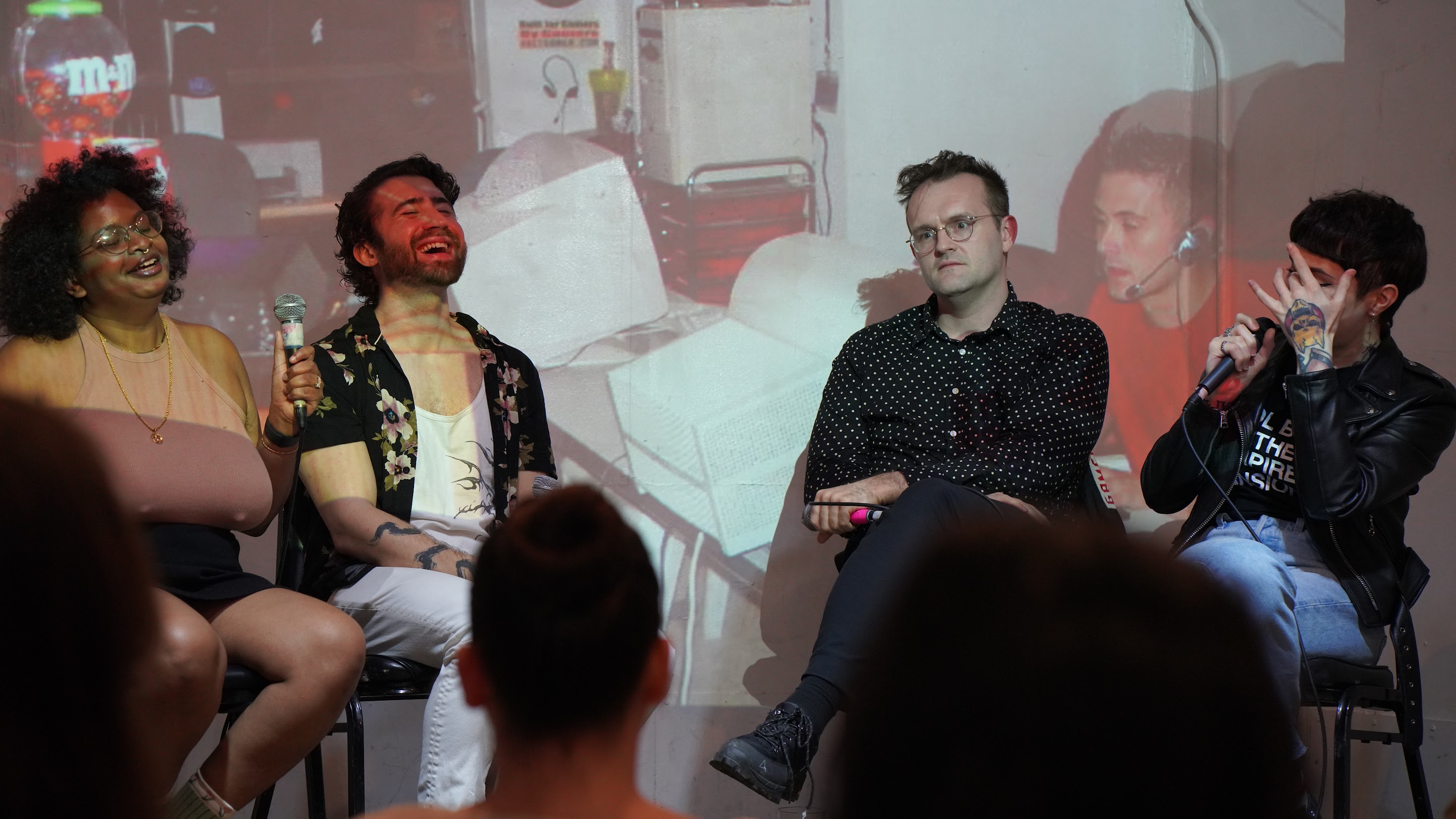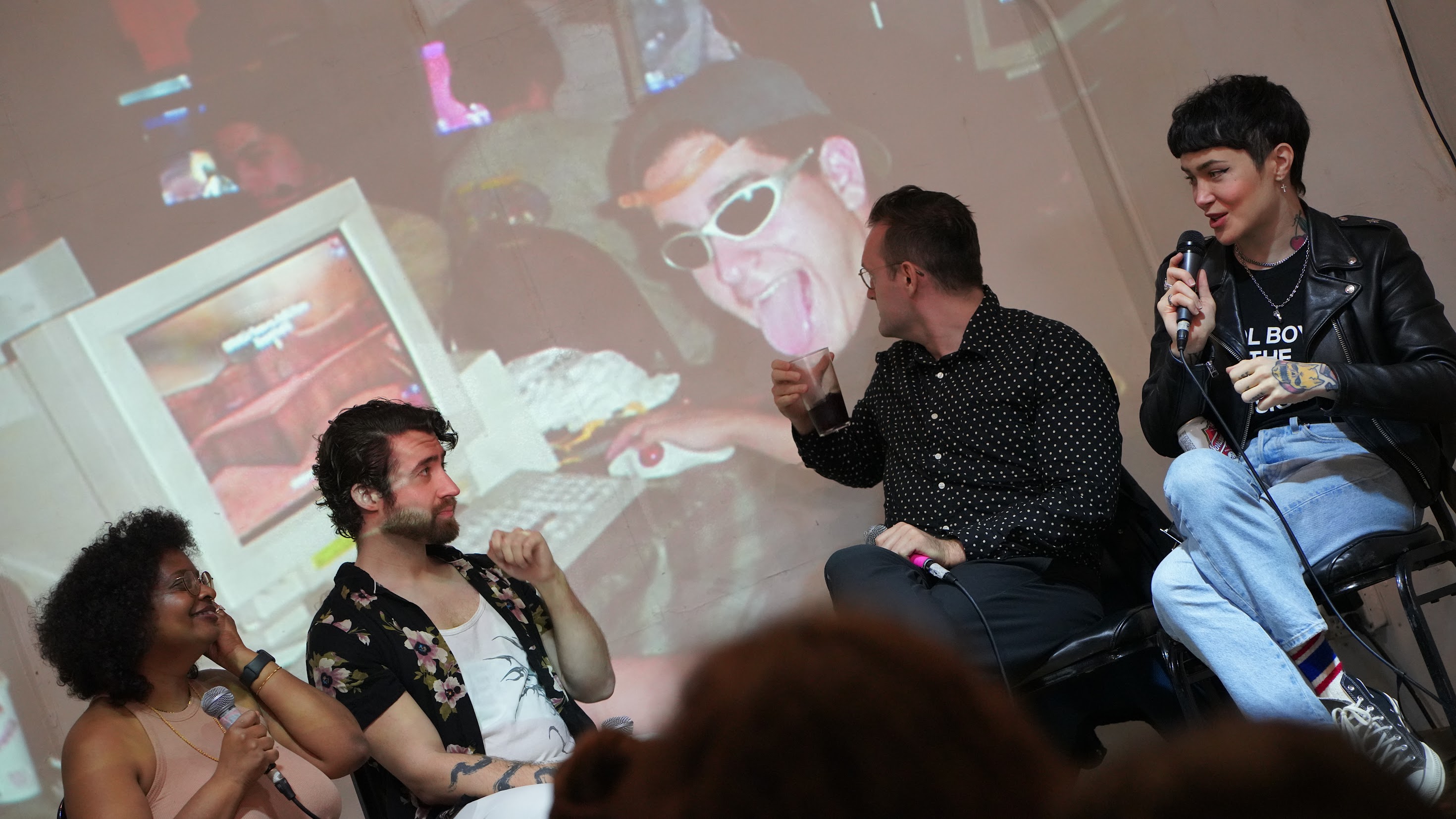Back in my day, we lugged our PC towers through 15 miles of bitter cold to play the original StarCraft in somebody’s mom’s living room, and we liked it. But not anymore. Now we’re lucky if two people on the same subway train have Steam Decks, and no one speaks of it. What happened to LAN parties? Why did they die, and what did we lose when the modern cyber-dystopia rendered them obsolete? On a special bonus episode of Aftermath Hours, we discuss that.
Due to the Fourth of July holiday, we weren’t able to get everybody together to stream on Twitch and record this week, so instead, this week’s episode takes the form of a live discussion we had a couple months ago with Merritt K, author of LAN Party: Inside the Multiplayer Revolution. (You can read an excerpt from the book here.)
We spent our time on stage at Wonderville in Brooklyn discussing the golden age of LAN parties and why they (sadly) went away. Also Bawls soda, because you can’t have a discussion of LAN parties and the early 2000s without Bawls. Here is the never-before-released recording of… all of that.
You can find this week's episode below and on Spotify, Apple, or wherever else you prefer to listen to podcasts. If you like what you hear, make sure to leave a review so that we can bring back LAN parties for all and ensure that they are mandatory.
A portion of our conversation:
Merritt: Is there anything to this idea that we’ve lost something by people not getting together to play games like this anymore? Because I know obviously people still do it, but when you look at the ways young men, especially, interact with people online and how that’s often organized around gaming, the way those people play games is [that] they’re in their rooms connecting to strangers on Fortnite. There’s a limit to how much of an asshole you can be if you’re in a room with a bunch of other people, because at some point, you’re just gonna get your ass kicked, whereas no one can reach through the computer yet. I mean, once that technology gets developed… just a gloved hand reaches through and goes [slapping sound]. But obviously a lot of LAN parties were mainly but not exclusively young, white guys.
Gita: When you think about that, the interesting counterpoint – it’s not really a counterpoint, but it’s the exception that proves the rule – is the fighting game community. That comes from an urban environment mostly, places where there are local arcades, so you don’t need to have your own personal computer to have a LAN party. The LAN party as a suburban phenomenon was something that was bridging the gap of not having access to a local arcade. That’s probably why they played different types of games. But the fighting game community, I’m thinking specifically of the one that comes from Times Square-area arcades that’s so different demographically. It’s not a problem-less community; there’s problems in it, obviously. But it’s way, way, way more diverse than the rest of the mainstream gaming community. There’s just so many more black people there.

Chris: There’s also a more common persistence of memory of what the culture was. And I think that has to do with how the fighting game community interacts with Japanese arcade culture in some ways. There’s more memory to it, and it’s healthier. LAN party shit ends up being extended to esports. Esports culture is where a lot of this American LAN party culture comes from aesthetically too.
Gita: The Riot Games people were people who were doing LAN parties in their dorm room and then made a company.
Chris: Yeah, and when we talk about Y2K aesthetic… I mean, on some level it never left, because I still have to buy an ugly Razer mouse. They’ve been trying to get it to be more Reddit and Scandinavian, but in a bad way with Logitech and all that shit where it’s like “Oh, what if we put a wood panel on this?”
Gita: I hate when they add a wood panel to it! I hate it.
Chris: I don’t want you to put a wood panel on a case. Powder coat it and make it metal. I need to rack-mount my PC case. That’s all. But no, I think there are aesthetic parts of the Y2K stuff now that is part of the basic language of PC gaming culture, but it’s tournaments-only and shit like that in a lot of ways. In the fighting game community, you can do remote stuff, but your locals are real. There’s oral knowledge there.
Gita: Yeah, [fighting game community] people have to interact with a physical space in a way that carries history with that space. There’s pictures of people in the same space from 20 years ago, whereas a lot of these [LAN party] spaces are someone’s parents’ house. Which is also fascinating. I love the curtain treatment in this picture [from Merritt’s book on the projector behind us].
Merritt: I love photos like this because, whenever we look back, there’s this retrospective imagining of what the time was like. When we think Y2K, we think bubble furniture, we think silver. But people’s houses still just looked like the ‘90s. They had these gauzy curtains and grandma’s china cabinet.
Chris: I don’t know if anyone saw Love Lies Bleeding. Great movie, but they actually got the ‘80s right, in that most of it looks beige. And then occasionally there’s ambient synth, and it’s like, you understand what that actually looked like. And it’s similar here. You’re in a weird basement with flash photography. Because the way the photos are taken is also very specifically rendered to late film or early digital. It renders flesh in an unflattering way. It’s untouched by AI. It’s straight flash. It’s somebody who has not moisturized or cleansed their face. It’s just the reddest guy you know. And there’s always curtains and shit, or a guy hanging from the ceiling.

Nathan: Oh yeah, there’s the famous photo of a guy who’s taped to the ceiling at a LAN party!
Gita: You just don’t get hijinks like that anymore.
Nathan: I mean, you can’t.
Gita: You physically cannot. The best I see is, I’ve been into Helldivers a bit, and the thing I keep thinking of is, somebody posted to the subreddit recently a chat message they got from a stranger which was “Hang on, I need to take another big hit of this democracy bong.”
Everybody: [Laughs]
Nathan: They might have one of those at QuakeCon, to be honest. But I do think there’s kind of a case to be made for the modern state of things, but in a way that’s a little more bittersweet. I’ve seen a lot of stories online of people who met somebody online, played games with them for years, and then eventually that game kind of fell off, and they’re like “With the game falling off, this relationship I had with somebody where we talked every night for two years – they were one of my closest friends – just kinda went away. I never really heard from them again.”
That’s really interesting, because on one hand you have these instances of very strong male friendship, which is often hard to come by in adulthood, but on the other hand, it can just go away like that – with all this stuff unspoken. They probably never said to each other “You are my best friend. I care so much about you.” Because if they had said that, they probably would’ve kept in touch. But it was just always implied, and then it went away.


